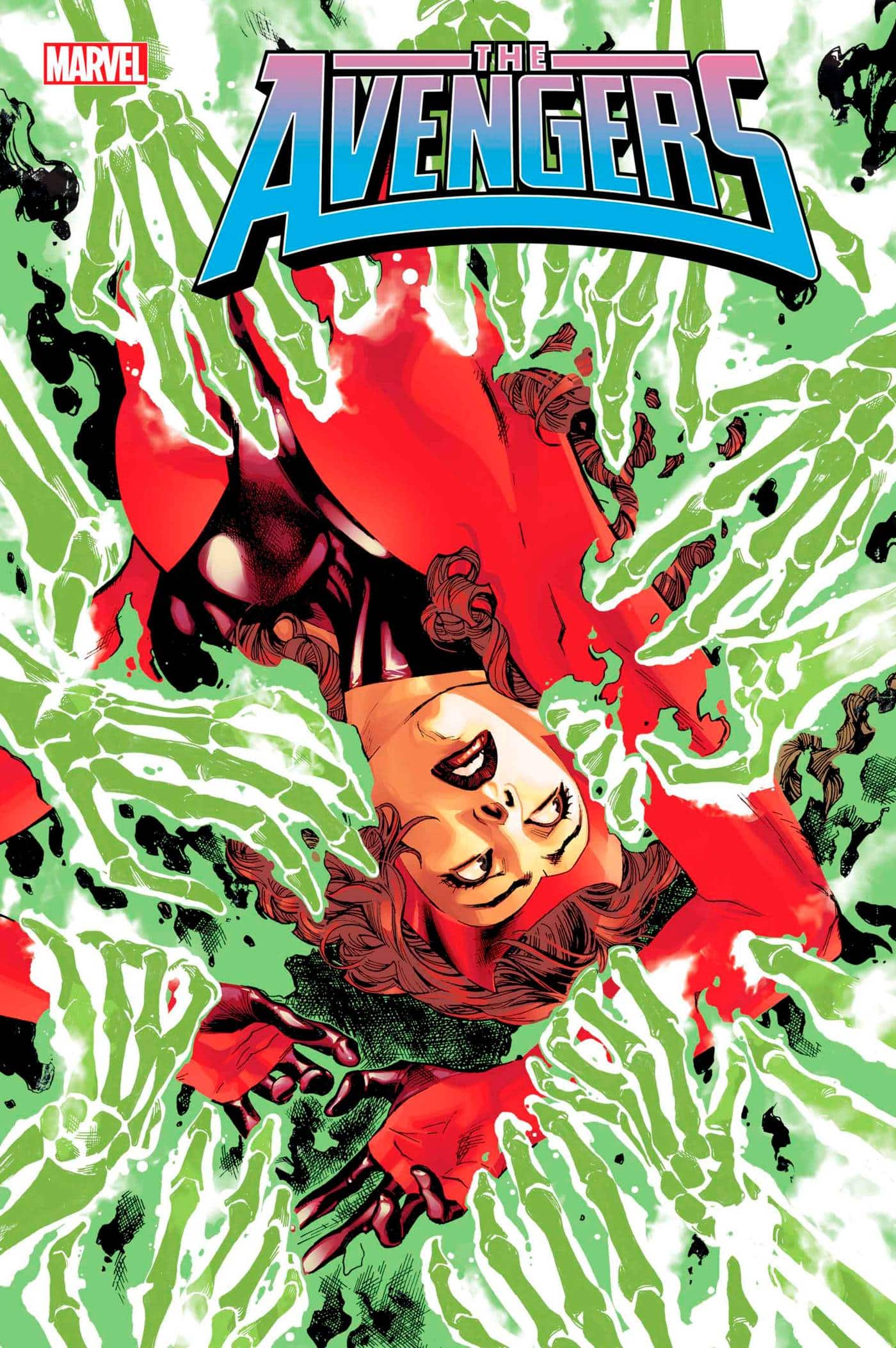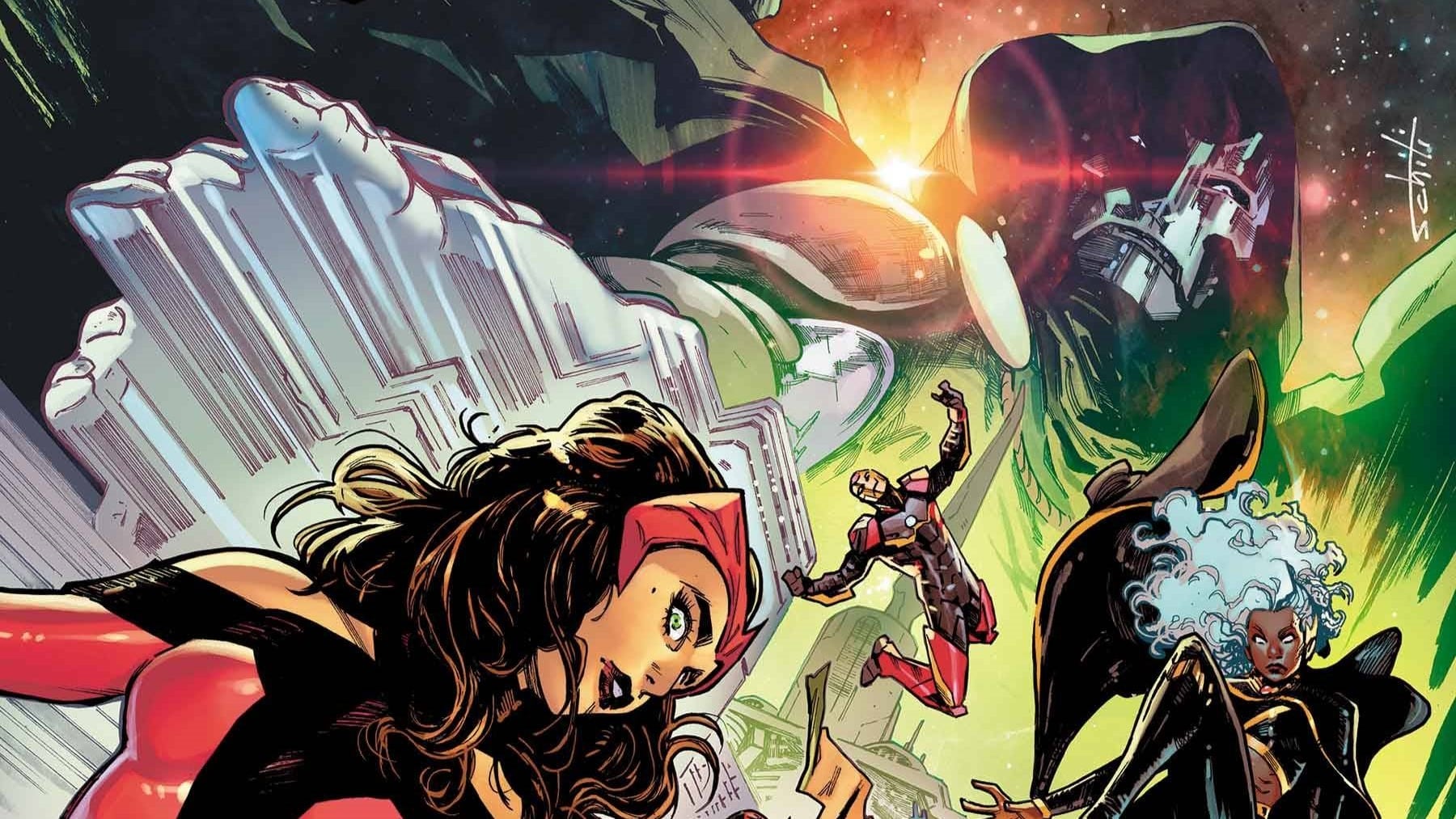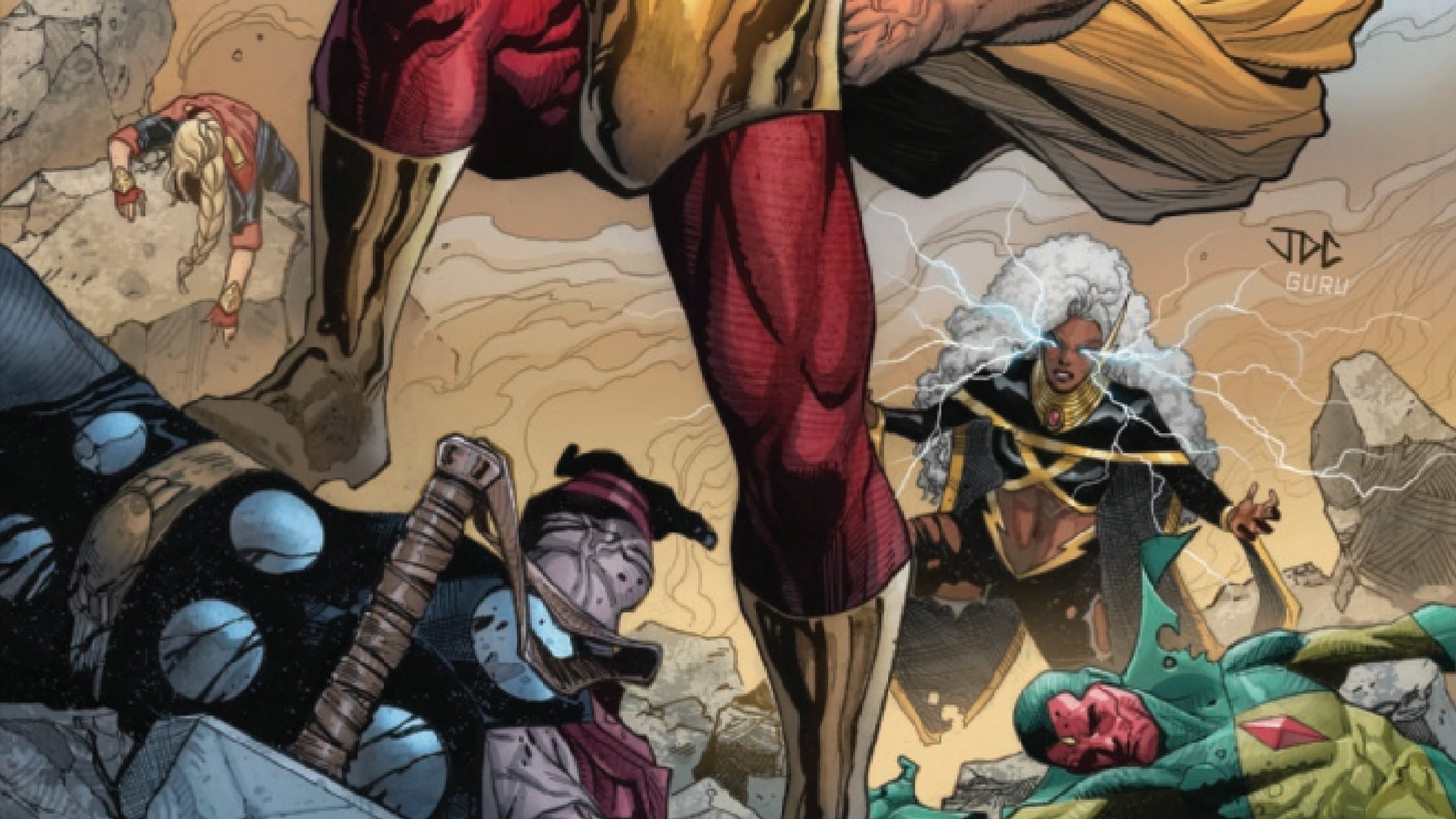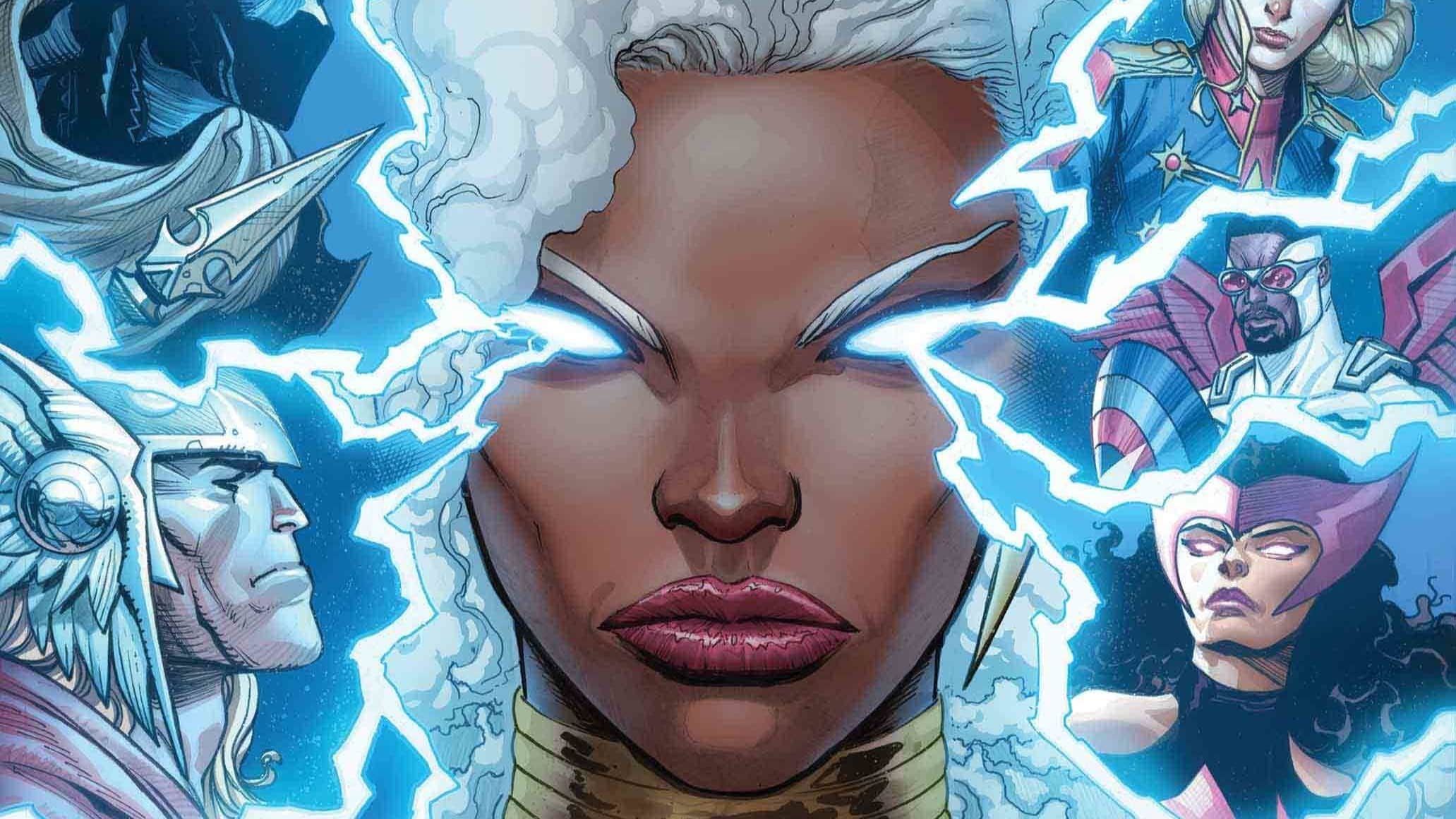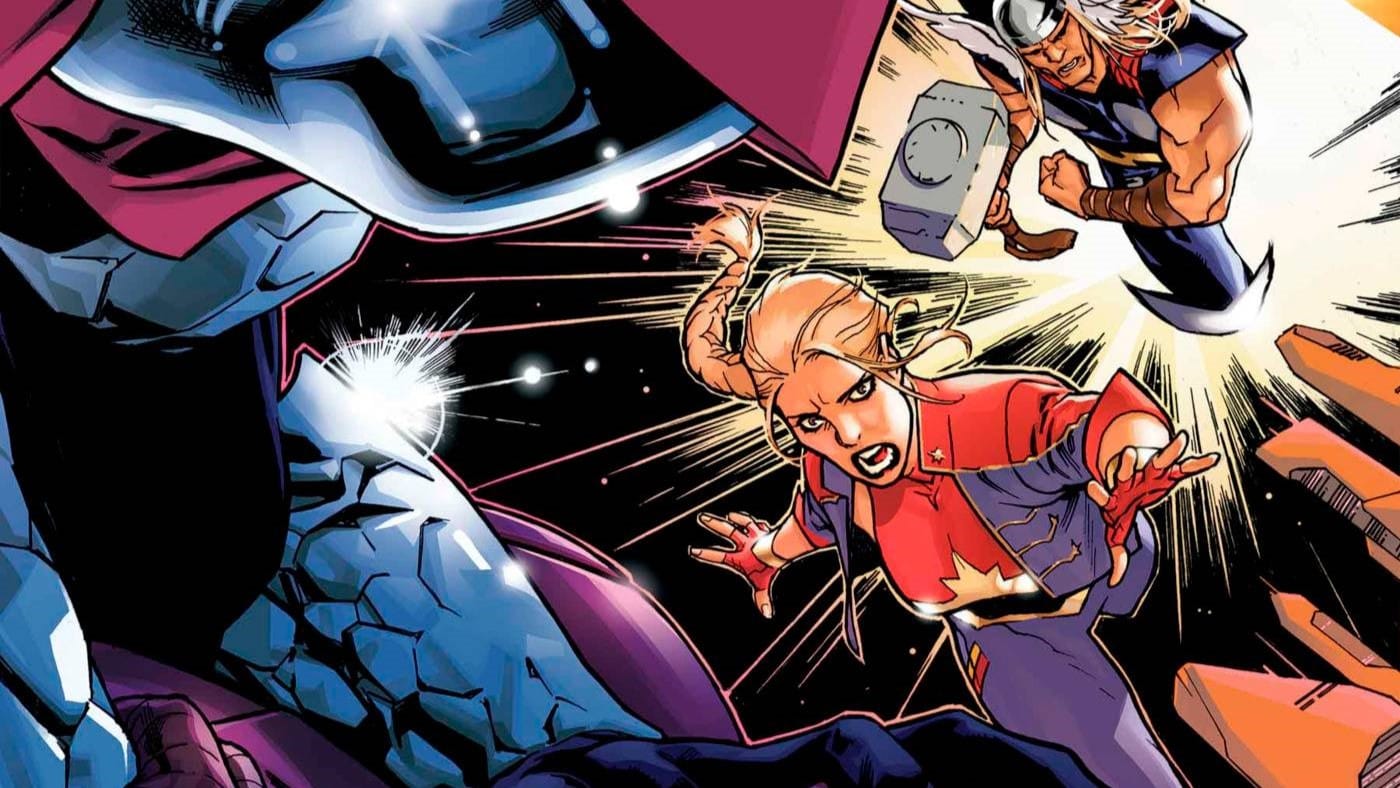The Avengers vs. The Ashen Combine! The haunted voice in the Impossible City! A comic so decompressed we might just have to start reviewing this arc by arc! We piece together what we can as we wait for what comes next, in Avengers #4 and #5, written by Jed MacKay, drawn by C.F. Villa and Ivan Fiorelli, colored by Federico Blee and lettered by Cory Petit.
Armaan Babu: I’ve been a fan of Jed MacKay for a while now. He’s done excellent work with characters in solo series and miniseries — he’s got a talent for getting right to what makes a character great, and the kind of stories you can get with them and them alone.
I am not feeling that from this book. It is…shakily paced, and the battle with the Ashen Combine, that has been taking place over the past three issues, still feels like it’s barely begun. We decided to cover two issues of this book together instead of one, just so we’d have something to respond to — but if this pacing keeps up, I’m tempted to try and do it arc by arc.
In short…I want to enjoy this comic, I really do, but it’s moving too slowly for me to easily respond to it.
Anna Peppard: I’ve similarly struggled with figuring out how to describe — and review! — this book. On the one hand, there are some spectacular dramatic moments, many of them courtesy of C.F. Villa who, in Avengers #3, continues to make this comic feel exactly as bombastic as an Avengers comic should. But breaking up the team for multiple issues at the start of a new run, before you’ve had a chance to establish team dynamics, while pitting our heroes against a bunch of brand-new cosmic foes whose mysteriousness just keeps getting more mysterious… I think it’s fair to question the effectiveness of these narrative choices.
That said — there is lots to like and even love in both of these issues, and I’m still invested in where the story’s heading. Prepare for an outworld sortie into a vibrant discussion of all things venable and vexatious.
Avengers vs. The Ashen Combine

Armaan: In Avengers #3, the Avengers split up — while Captain America and the Black Panther explore the Impossible City, the city-killing Ashen Combine’s home, each member of the rest of Avengers chooses a member of the Ashen Combine to go one-on-one against. We saw thematic reasons for why each Avenger went up against their respective city-killers, and over Avengers #4 and #5, we see each of these battles unfold…slowly.
As I said in our last review, I love the design of the Ashen Combine, and how unique their designs and powers are (well, aside from, perhaps, The Dead), but these battles aren’t quite landing for me. I think part of the problem is that they feel less like battles than they do thematic debates.
Sure, Idol Alabaster vomits out worship as energy beams and has sharpened wingtips that can pierce even Thor’s flesh, but what their fight is really about is what kind of god Thor is, and whether or not he cares about his followers. The Dead confronts Wanda with her own fears, and the Meridian Diadem has the Vision fighting the abstract concept of neglectful, self-serving parenthood. (Iron Man is forced to confront his own…artlessness?)
The artists are getting to go all out on these fights; and they are gorgeous. Iron Man swoops around a city whose steel, stone, glass and concrete are trying to grab at him. Lightning flashes as a god and a blasphemous angel weave in and out of each other, drawing blood above the Vatican. Tornadoes of red and green energy clash as the raging corpses of the dead try to overwhelm Earth’s mightiest witch. It’s utterly gorgeous spectacle, (although the artist change in #5 is a mild step down). The problem is that the art feels like it’s a mere backdrop for the villainous speeches happening, and the heroes’ retorts — nothing on panel matters so much as the words that are being said, as if all that the art is bringing to the story is spectacle.
Anna: To the extent these comics excite me, it’s mostly due to the art. As I mentioned in my intro, Villa keeps killing. I was particularly struck by the splash page in issue #4 where a cavernous maw of transmogrified city-parts, with concrete for skin and steel girders for teeth, bends its boneless jaw impossibly wide to swallow Iron Man. I also enjoyed the half-splash of Wanda being wrenched against the wind by a tangled, teetering tower of skeletons.
While Ivan Fiorelli’s style isn’t quite as visionary in issue #5, he still finds spaces to chew the scenery; Meridian Diadem breaking open her jaw and chest to reveal a soft metallic husk full of stars definitely made me stop and look a while. And speaking as someone who fell hard and forever for the grace and nobility embodied by John Buscema’s iconic stylings of the Vision, I enjoyed Fiorelli’s reminiscently lithesome version of the character, whose beauty in battle expresses his calculated (and calculating) self-confidence (or, as the case may be, overconfidence).
But as you alluded to above, Armaan — some of these moments feel a bit cold, a bit abstracted. Because even though I know Vision, Wanda, Tony, Carol, and Thor plenty well from other stories, this story isn’t those stories. I wish I had a better sense of who these heroes are in this place and time, which would give me a better sense of the emotional and physical stakes involved. Maybe the idea is to debut our heroes as ideas before individuating and finally humanizing them through these philosophical, physical clashes. But I wish I didn’t have to imagine possible futures to properly enjoy the present.
Armaan: What’s also lacking is any kind of unity. Every member of the Ashen Combine would make for a really interesting villain in their own right, and the way they are thematically paired with the Avengers? It would be fascinating, if they had appeared in these characters’ solo series. The Ashen Combine, though, don’t really have anything that makes them a team — and as it stands, neither do these Avengers. What this feels like is six small slices covering six separate stories, that are only loosely tied together overall.
It is an odd choice to have people split up for this long in what’s meant to be a team book, and so far, it’s not working. I was really looking forward to seeing this team’s dynamic — but as of now, the closest we have to that is Black Panther and Captain America exploring a sentient city, high above the Earth.
Anna: I can only assume we’re heading toward a team-up. That’s the point of the Avengers, after all — to fight threats no one can face alone and all that. But there I go again, prognosticating about comics yet to come instead of talking about what we’ve got. Like you, I’m clearly getting impatient. It’s taken three issues for our heroes to properly engage the Ashen Combine, and we’re still not really sure who they are, where they came from, or why they do what they do, other than the fact they seem deeply, irredeemably evil. But there’s gotta be more to it, right…? The mystery of the Impossible City suggests there might be.
The Impossible City

Armaan: The one dynamic we do actually get to explore a little is the one between the Sam and T’Challa, though I’m not entirely sure I understand what’s happening here and might need someone much cleverer than I to explain it to me (cue the illustrious Dr. Anna Peppard). Why do these two dislike each other so much? Sam seems to suspect that T’Challa might somehow be okay with the deaths of innocents, despite having known the Black Panther for years — and T’Challa, naturally, dislikes being lectured.
It feels like it’s coming out of nowhere, and beyond that, I am left wondering — what is this meant to be saying about these characters? That Sam can be preachy, and T’Challa ruthless — both to the extent that it will cause friction within the team? It’s a conflict that is not interesting, nor earned — nor does it feel pertinent to the larger story at hand. I’d ignore it entirely, but it’s a crumb of inter-team interaction that I am starving for with this book, so perhaps it’s getting a lot more scrutiny than it deserves.
Anna: I’m assuming Sam and T’Challa’s dynamic has something to do with stuff that happened in recent Black Panther comics, especially the “King No More” storyline, which involved T’Challa using sleeper agents to spy on the Avengers. For me, there have been enough narrative kernels to get where Sam is coming from. But how dislocated it made you feel perhaps underscores something I discussed above, which is the fact we never really got any team-building time with this team before they split up and effectively stopped being a team. I don’t expect MacKay to hold my hand; this isn’t baby’s first Avengers comic. But having a stronger sense of MacKay’s specific spin on these characters and their interpersonal dynamics would go a long way.
All of that said — T’Challa has been the best character in this book so far. He’s the only one who really seems to be thinking things through, and the only one who has demonstrably interesting motives. He’s the guy with all the backup plans and cool tech who we maybe don’t trust but want to, because he’s the Black Panther and that’s gotta count for something. Maybe that has to do with the fact T’Challa’s story feels more tied to recent continuity than the stories of the other characters. While I don’t demand the Marvel comics universe of 2023 maintain tight line-wide continuity, it does feel strange to be reading a version of Tony Stark who feels so completely divorced from the fact he’s currently getting married in other comics. Maybe Kang will return to wave a timewand at the problem?
Armaan: As for the Impossible City itself — I’m not sure we’ve been told yet what gives it its name, but we learn a fair bit about it in #5. It once belonged to a more heroic group, but the Ashen Combine took control of it and forced it to become an accessory to their genocidal venturings. All while leaving it its own conscience, so it could feel terrible about the things it’s been forced to do.
Letterer Cory Petit does simple but powerful work here. Despite being on edge with impatience with this book’s pacing, I felt for the city. For the pain it has in its own helplessness — forced to watch, but unable to commit any act of defiance beyond suicide. It’s anguished frustration hits hard, despite the fact that we see nothing expressive from the city; it’s only form of expression is its disembodied voice.
Which is where we do get our one unifying moment: The Avengers are the one group that are going to stand up, and say: No.
I liked this moment, especially if it ends up being a longer term mission statement, if that’s our unifying thing. Who are the Avengers? The people who stare in the face of apparently inevitable doom, and no matter what their differences, are the ones who say, “No.”
Anna: I wanted to be here for this hero moment; I wouldn’t be an avid reader of superhero comics if I didn’t love leaning into crowd-pleasing tropes! But I’m not sure if it felt earned. Why have our heroes suddenly, finally, collectively had enough? I wish there’d been a bit more impetus beyond them being tired of losing, and/or the desire for a dramatic stinger to end issue #5.
When Does This Comic Get Started?

Armaan: This comic leaves me restless. There are still moments here I enjoy, but I barely get a taste of something, barely start to get a moment to latch on to before we’re whisked away to an entirely different scene — or we meet the end of the issue. Figuring out what to say about this comic is becoming challenging, because it — constantly — feels like the most exciting stuff is what’s yet to come.
Now, this comic has had a bunch of great smaller moments. Every issue has a handful of good ones, really, whether they be because of the dramatic staging, iconic mission statements, or simply moments that give our heroes the best spotlight they could receive. As you discussed above, Anna — Villa’s art absolutely hit the mark, that sense of awe that it’s going for, aided greatly by the work of Frederico Blee. Enough of those moments to sell me on the wait; I believe that the big moments this book is promising, when they get there, are going to have been worth the wait.
It’s just that the journey there is rather unsatisfying.
Anna: I’m not not recommending this book. Every issue has things I enjoy; it’s solid superhero stuff with stupendous setpieces. But I’m also tempted to encourage folks to read it in trade, where you can enjoy the setpieces without being frustrated by their frustration of the story’s narrative momentum.
In any case — I’ll definitely be back next month. Because I adore sharing my mixture of awe and anxiety with Armaan. And because I need to know whether Tony saves Toronto, his “second-favorite city.” Surely his favorite is Montreal…? I can’t abide the thought of losing to anyone else.
‘Til next time!
Avengers Assortments!
- While nearly all of our team get a moment of rebellion against the Ashen Combine, to tell them a resounding ‘No,’ it’s notable that Iron Man is missing from that montage. Should we be worried about how badly the Citysmith has defeated him, trapped as the Armored Avenger is in a malevolent monument to his own failure?
- Tony’s there! Though he’s kinda obscured by the coloring, and because Carol insists on exceeding her panel (as is her right, as The Star). But we need to leave your speculations in because my alliteration loving soul refuses to live without the phrase “malevolent monument.”
- Vision’s density-altering powers feel a lot less cool when every other villain counters it with a simple “Ahhh, I have dealt with this kind of problem before!”
- Perhaps the hardest pill to swallow, interpersonal dynamics-wise, is the fact we’re four issues in and Wanda and Vision have barely acknowledged each other’s existence. I’m not demanding or expecting a grand romantic reunion. But to put them on the team together and not mine their tumultuous past for drama is… a choice.
- Fiorelli has a lot of fun drawing Black Panther’s lil’ ears and I’m happy for him.

